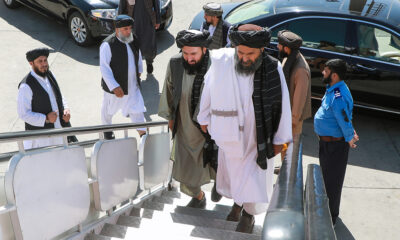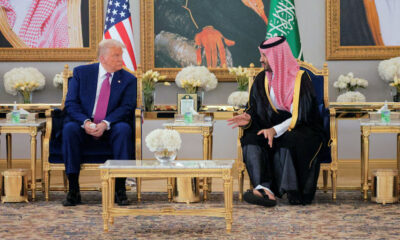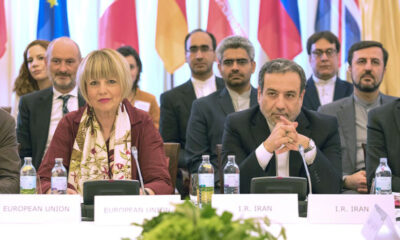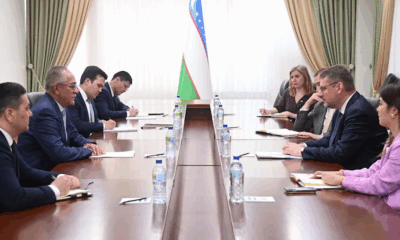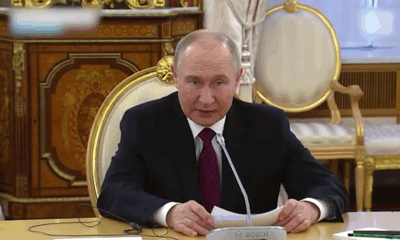World
Russia and China slam NATO after alliance raises alarm
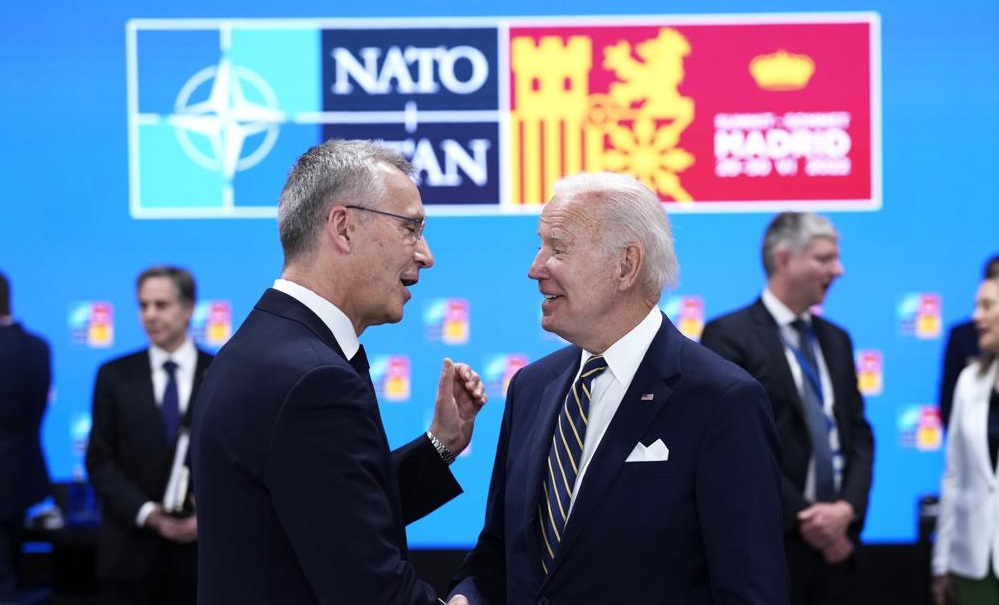
NATO faced rebukes from Moscow and Beijing on Thursday after it declared Russia a “direct threat” and said China posed “serious challenges ” to global stability.
The Western military alliance was wrapping up a summit in Madrid, where it issued a stark warning that the world has been plunged into a dangerous phase of big-power competition and myriad threats, from cyberattacks to climate change, The Associated Press reported.
NATO leaders also formally invited Finland and Sweden to join the alliance, after overcoming opposition from Turkey. If the Nordic nations’ accession is approved by the 30 member nations, it will give NATO a new 1,300 kilometer border with Russia.
Russian President Vladimir Putin warned he would respond if the Nordic pair allowed NATO troops and military infrastructure onto their territory. He said Russia would have to “create the same threats for the territory from which threats against us are created.”
Estonian Prime Minister Kaja Kallas said Putin’s threats were “nothing new.”
“Of course, we have to expect some kind of surprises from Putin, but I doubt that he is attacking Sweden or Finland directly,” Kallas said as she arrived at the summit’s conference center venue. “We will see cyberattacks definitely. We will see hybrid attacks, information war is going on. But not the conventional war.”
China accused the alliance of “maliciously attacking and smearing” the country. Its mission to the European Union said NATO “claims that other countries pose challenges, but it is NATO that is creating problems around the world.”
NATO Secretary-General Jens Stoltenberg said Moscow’s invasion of Ukraine had brought “the biggest overhaul of our collective defense since the end of the Cold War.”
The invasion shattered Europe’s peace, and in response NATO has poured troops and weapons into Eastern Europe on a scale unseen in decades. Member nations have given Ukraine billions in military and civilian aid to strengthen its resistance, AP reported.
Ukrainian President Volodymyr Zelenskyy, who addressed the summit by video link, asked for more. He urged NATO to send modern artillery systems and other weapons and warned the leaders they either had to provide Kyiv with the help it needed or “face a delayed war between Russia and yourself.”
“The question is, who’s next? Moldova? Or the Baltics? Or Poland? The answer is: all of them,” he said.
At the summit, NATO leaders agreed to dramatically scale up military force along the alliance’s eastern flank, where countries from Romania to the Baltic states worry about Russia’s future plans.
They announced plans to increase almost eightfold the size of the alliance’s rapid reaction force, from 40,000 to 300,000 troops, by next year. The troops will be based in their home nations but dedicated to specific countries in the east, where the alliance plans to build up stocks of equipment and ammunition.
U.S. President Joe Biden, whose country provides the bulk of NATO’s firepower, announced a hefty boost in America’s military presence in Europe, including a permanent U.S. base in Poland, two more Navy destroyers based in Rota, Spain, and two more F35 squadrons in the U.K.
The expansion will keep 100,000 troops in Europe for the foreseeable future, up from 80,000 before the war in Ukraine began.
World
Trump offers to join potential Russia-Ukraine talks in Turkey
Putin and Zelenskiy have not met since December 2019 – over two years before Russia launched its full-scale invasion of Ukraine – and make no secret of their contempt for each other.
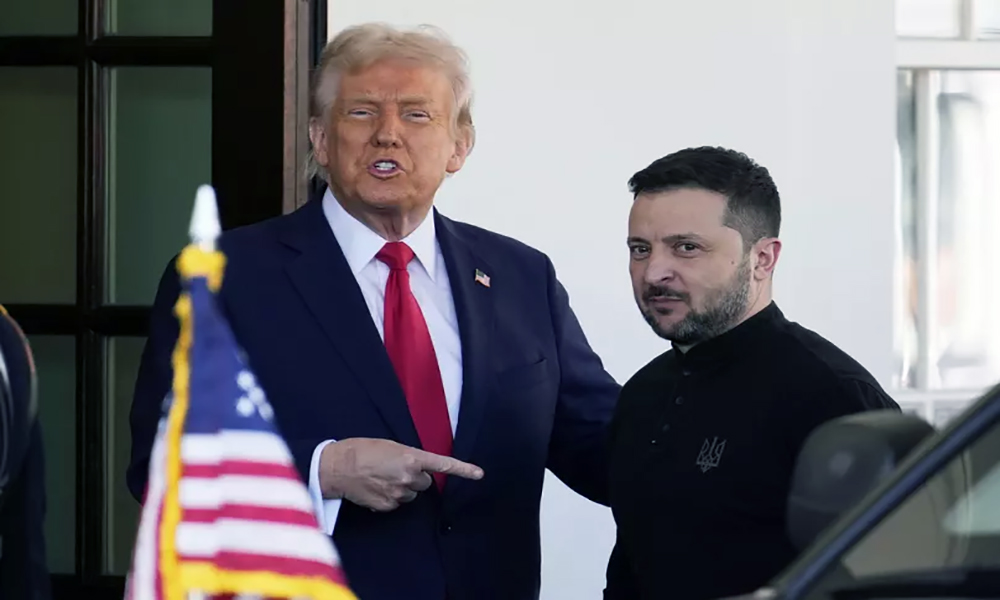
U.S. President Donald Trump offered on Monday to join prospective Ukraine-Russia talks in Turkey later this week as European countries pushed to get the Kremlin to accept their demand for a 30-day ceasefire in the war in Ukraine, Reuters reported.
Trump spoke a day after Ukrainian President Volodymyr Zelenskiy, in a fresh twist to the stop-start peace talks process, said he would travel to Istanbul where, he said, he would be waiting to meet Russian counterpart Vladimir Putin.
Trump told reporters at the White House that talks in Istanbul could be helpful and he might join them on Thursday while in the region. His current schedule has him visiting Saudi Arabia, the United Arab Emirates and Qatar this week.
“I’ve got so many meetings, but I was thinking about actually flying over there. There’s a possibility of it, I guess, if I think things can happen, but we’ve got to get it done,” he said before departing for his second foreign trip since his second term in the White House began in January, read the report.
“Don’t underestimate Thursday in Turkey,” Trump said.
Later, in his nightly video address, the Ukrainian president noted that Russian attacks had continued on the front lines throughout the day, and Moscow still had not responded to his call for Putin to meet him for talks in Turkey later in the week.
“Russian shelling and assaults continue,” Zelenskiy said. “Moscow has remained silent all day regarding the proposal for a direct meeting. A very strange silence.”
Diplomatic contacts were renewed.
Zelenskiy and Turkish President Tayyip Erdogan discussed the proposed direct talks which Zelenskiy said “may help end the war”. Erdogan described the proposed meeting as a new window of opportunity which was not to be squandered.
Russian Foreign Minister Sergei Lavrov spoke by telephone with his Turkish counterpart Hakan Fidan about Putin’s proposed talks with Ukraine on Thursday. But a brief Russian foreign ministry account gave no indication whether Putin would accept Zelenskiy’s proposal to meet him, Reuters reported.
Earlier on Monday, the German government said Europe would start preparing new sanctions against Russia unless the Kremlin by the end of the day started abiding by a 30-day ceasefire in its war with Ukraine.
Ukraine’s military said Russia had conducted dozens of attacks along the front in eastern Ukraine on Monday as well as an overnight assault using more than 100 drones, despite the ceasefire proposal by Europe and Kyiv.
“The clock is ticking,” a German government spokesperson said at a news conference in Berlin.
Russian Foreign Ministry spokeswoman Maria Zakharova said the 30-day ceasefire had been put forward by European countries “in order to provide a breather for Kyiv to restore its military potential and continue its confrontation with Russia.”
It is unclear, though, how much impact fresh European sanctions would have on Russia, especially if the United States does not join in as well.
The leaders of four major European powers travelled to Kyiv on Saturday and demanded an unconditional 30-day ceasefire from Monday. Putin, implicitly rejecting the offer, instead proposed direct Russia-Ukraine talks in Istanbul that he said could potentially lead to a ceasefire, read the report.
Putin and Zelenskiy have not met since December 2019 – over two years before Russia launched its full-scale invasion of Ukraine – and make no secret of their contempt for each other.
Responding to the ceasefire proposal, Russia said at the weekend it is committed to ending the war but that European powers were using the language of confrontation.
Ukrainian Foreign Minister Andrii Sybiha said Russia was “completely ignoring” the ceasefire initiative, citing what he said were continued attacks on Ukrainian forces.
He said he shared information about the continued fighting with European partners and U.S. Secretary of State Marco Rubio on a joint phone call. The allies had agreed sanctions would be needed to pressure Russia if it snubbed the truce move.
Russia and Ukraine are both trying to show Trump they are working towards his objective of reaching a rapid peace in Ukraine, while trying to make the other look like the spoiler to his efforts.
The Ukrainian military’s general staff said that as of 10 p.m. (1900 GMT) on Monday there had been 133 clashes with Russian forces along the front line since midnight, when the ceasefire was to have come into effect.
Ukraine’s top commander, Oleksander Syrskyi, was quoted by Zelenskiy as saying the heaviest fighting still gripped the Donetsk region, the focus of the eastern front, and Russia’s western Kursk region, nine months after Kyiv’s forces staged a cross-border incursion.
The fighting was at the same intensity it would be if there were no ceasefire, said Viktor Trehubov, a spokesperson for the military on Ukraine’s eastern front.
Kyiv is desperate to unlock more of the U.S. military backing it received from Trump’s predecessor, Joe Biden. Moscow senses an opportunity to get relief from a barrage of economic sanctions and engage with the world’s biggest economy.
World
Hamas in talks with US about Gaza ceasefire and aid, says senior Palestinian official
The U.S. had previously held discussions with the Palestinian militant group on securing the release of U.S. hostages held in Gaza, read the report.
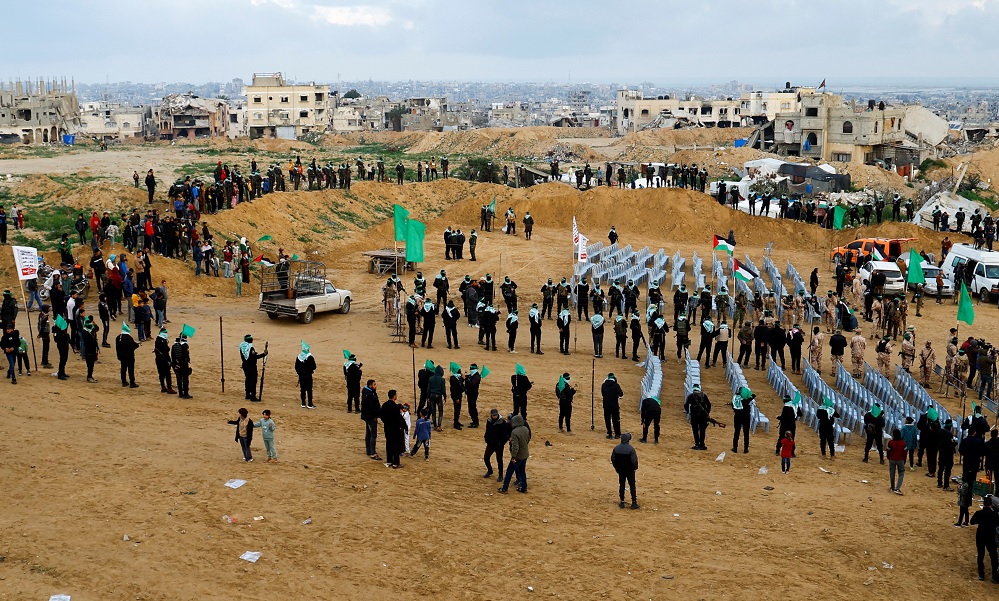
Talks between Hamas and the U.S. administration on a ceasefire in Gaza and the entry of humanitarian aid to the besieged enclave are underway, a senior Palestinian official familiar with the discussions told Reuters on Sunday.
U.S. President Donald Trump recently repeated a pledge to help get food to Palestinians in Gaza. A U.S.-backed mechanism for getting aid into Gaza should take effect soon, Washington’s envoy to Israel also said on Friday.
A State Department spokesperson said: “We cannot speak to ongoing negotiations, but I will note recent statements by Qatar and Egypt that they are continuing to engage in pursuit of an agreement.”
The spokesperson said that Hamas bore sole responsibility for the war as well as for the resumption of hostilities.
“President Trump has made clear the consequences Hamas will face if it continues to hold the hostages, including American Edan Alexander and the bodies of four Americans,” the spokesperson added.
The U.S. had previously held discussions with the Palestinian militant group on securing the release of U.S. hostages held in Gaza, read the report.
Israeli media reported on Sunday that Prime Minister Benjamin Netanyahu had told a closed session of the Foreign Affairs and Defense Committee that Hamas could soon release Alexander, an American-Israeli hostage, as a goodwill gesture towards Trump, who will visit this Middle East this week.
The prime minister’s office did not immediately respond to a request for comment on the reports.
Since March 2, Israel has cut off all supplies to the 2.3 million residents of Gaza, and food stockpiled during a ceasefire at the start of the year has all but run out.
On March 18, Israel effectively ended the January ceasefire agreement with Hamas and renewed its military campaign in Gaza, Reuters reported.
Hamas has said it is willing to free all remaining hostages seized by its gunmen in attacks on communities in southern Israel on October 7, 2023, and agree to a permanent ceasefire if Israel pulls out completely from Gaza.
Israel, vowing the war can only stop once Hamas is stamped out, has said it plans to expand its military campaign in Gaza, which has been devastated during the war and prompted warnings from the U.N. that the population faces imminent famine.
The October 2023 Hamas attacks killed 1,200 people, and 251 were taken hostage back to Gaza, according to Israeli tallies. Israel’s campaign has killed more than 52,800 Palestinians, mostly civilians, according to Hamas-run health authorities.
World
Trump says India, Pakistan agree to ‘full and immediate ceasefire’

U.S. President Donald Trump said on Saturday that India and Pakistan had agreed to a “full and immediate ceasefire” after a fourth day of strikes and counter-strikes against each other’s military installations.
Pakistan’s foreign minister also said both countries had agreed to a ceasefire “with immediate effect” and India’s foreign ministry said it would start at 5 p.m. Indian time (1130 GMT).
“After a long night of talks mediated by the United States, I am pleased to announce that India and Pakistan have agreed to a FULL AND IMMEDIATE CEASEFIRE. Congratulations to both Countries on using Common Sense and Great Intelligence,” Trump said in a post on Truth Social.
The sudden announcement came on a day when fears spiked that the countries’ nuclear arsenals might come into play as Pakistan’s military said a top military and civilian body overseeing its nuclear weapons would meet.
But Pakistan’s defence minister later said no such meeting was scheduled.
At the same time, officials from both sides showed a willingness to take a step back following the day’s exchanges, as the combined civilian death toll on the two sides rose to 66.
“Pakistan and India have agreed to a ceasefire with immediate effect,” Pakistani Foreign minister Ishaq Dar posted on X. “Pakistan has always strived for peace and security in the region, without compromising on its sovereignty and territorial integrity!”
India’s foreign ministry said that the head of Pakistan’s military operations called his Indian counterpart on Saturday afternoon and it was agreed that both sides would stop all firing.
The two heads will speak to each other again on May 12, the ministry added.
The fighting began on Wednesday when India carried out strikes on what it said was “terrorist infrastructure” in Pakistani Kashmir and Pakistan, two weeks after 26 people were killed in an attack on Hindu tourists in Indian Kashmir.
Pakistan denied India’s accusations that it was involved in the tourist attack. Since Wednesday, the two countries have exchanged cross-border fire and shelling, and sent drones and missiles into each other’s airspace.
The countries have been locked in a dispute over Kashmir since they were born after the end of British colonial rule in 1947. Hindu-majority India and Islamic Pakistan both claim Kashmir in full but rule it in part.
They have gone to war three times since, including twice over Kashmir, and clashed several times.
India blames Pakistan for an insurgency in its part of Kashmir that began in 1989 and has killed tens of thousands. It also blames Pakistani Islamist militant groups for attacks elsewhere in India.
Pakistan rejects both charges. It says it only provides moral, political and diplomatic support to Kashmiri separatists.
(Reuters)
-
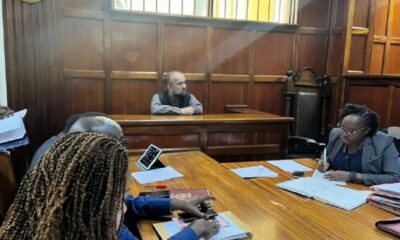
 Latest News5 days ago
Latest News5 days agoEx-Afghan deputy speaker Qadeer back in Kenyan court for criminal case
-

 Latest News4 days ago
Latest News4 days agoPakistan says India launched attack on Afghanistan, India denies
-

 Latest News5 days ago
Latest News5 days agoMCC Chief: Afghan cadres sent to China for AI training
-

 World4 days ago
World4 days agoUS offers to help India and Pakistan start talks, G7 also urges dialogue
-
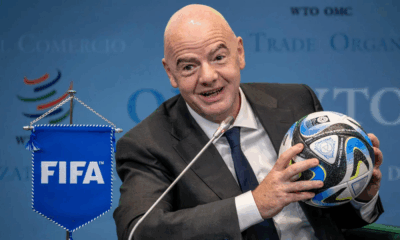
 Sport4 days ago
Sport4 days agoFIFA OKs creation of Afghanistan women’s refugee team
-
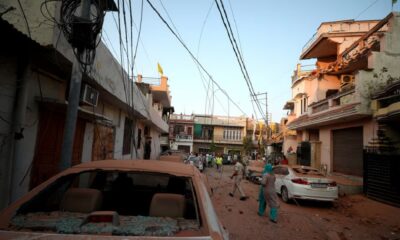
 Regional4 days ago
Regional4 days agoPakistan says it has launched military offensive against India
-
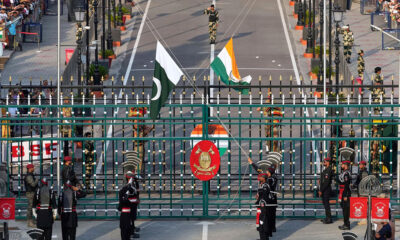
 Regional3 days ago
Regional3 days agoExplosions reported after India and Pakistan agree to ceasefire
-

 World4 days ago
World4 days agoTrump says India, Pakistan agree to ‘full and immediate ceasefire’




